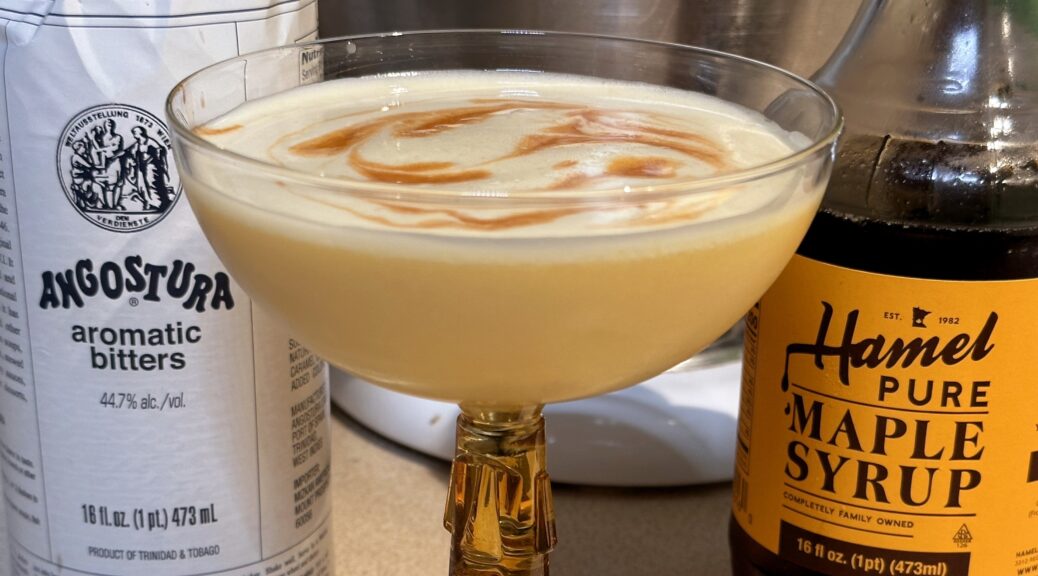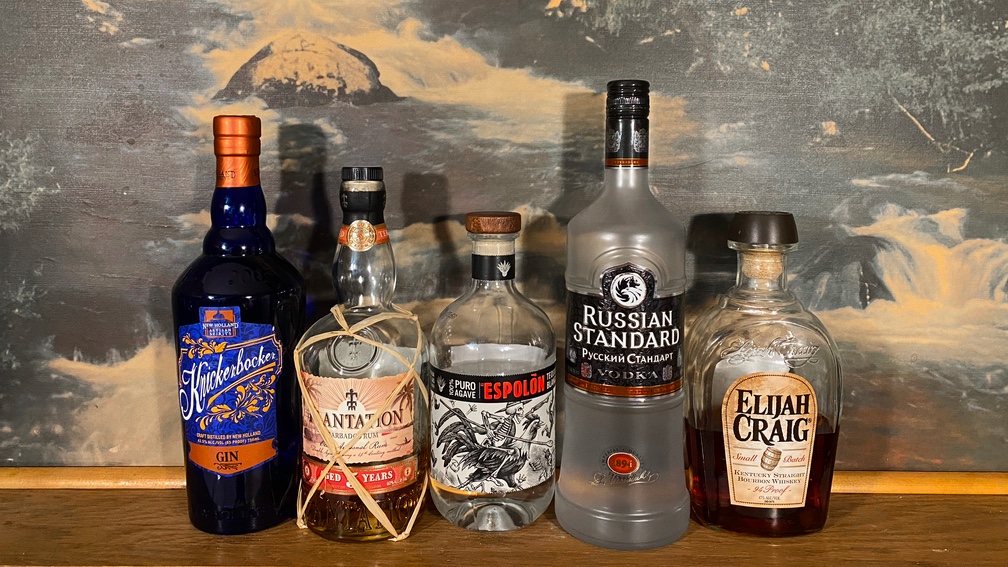Introduction
Building up a personal bar can be a delicious voyage of self-discovery. It can also be pretty flipping expensive, particularly if you develop a taste for vintage spirits or specialized cocktails (Tiki, for example). The good news is that there's been a lot of thought put into various schemes for stocking a nascent bar or for dealing with limited space for your cocktail ephemera.
I'm going to tip my hat to the various discussions of 9–12 bottle bars that were in vogue a half-dozen years ago or so. Like building a starting lineup and bench in baseball, it's good to have a few stars supported by several quality players who have positional flexibility. I'm going to divide the basic bar into three categories — spirits, liqueurs, & augmentors — with dedicated posts. That's where this conversation starts; where it ends is basically determined by a combination of your desire to explore, your palate, and your wallet.
One thing to remember: the marketing arms of every distiller & distributor on the plant expend a great amount of money & effort trying to convince you that you need to stock their bottles, which has both credible (the company has lasted forever) and dubious (the equipment/formula/technique to produce the spirit or liqueur has changed over time) claims to longevity. Beyond that, you'll be assailed by every claim of exclusivity & intangibles you can think of, and probably many you couldn't. Follow your tongue — the best bottle for you is one that tastes good and that you can afford to keep on hand.
Spirits
Unless you know from past experience you don't like one of the distillates below, you should probably plan on having a bottle of each of the following in your bar:
- gin
- rum
- tequila
- vodka
- whisk(e)y
With these, you'll have the base ingredient for most classic cocktails & quite a range of modern ones. My personal bar varies here because I don't drink whiskey often, but I love brandy, which I think most folks outside of the state where I reside view as a luxury spirit, if they think of it much at all. More on brandy, which actually figures significantly in both the classic and pre-classic cocktail eras, in a future installment.
Let's take each spirit in order, looking at the styles within, and good options for stocking a bar. I'll provide some selections at the Rail (~$20/bottle) and Call ($25+/bottle) level.
Gin
Rail: Aviation, Beefeater, Citadelle, Knickerbocker, Tanqueray
Call: Ford's, Junipero, Hendrick's, Plymouth, St. George Terroir
Gin can be pretty divisive. Some people like feeling as if they're drinking a glass of conifer juice, and some people really don't. The good news is, there are balanced and even juniper-neutral gins available. You probably already know whether you like a strong juniper taste in your gin, but if you don't, purchasing a couple single-serving bottles of options below and mixing up a Gin & Tonic will orient your preferences.
Classic, Juniper-Forward Gin
A London Dry or any of the modern, New World Gin descendants of that style will suit this preference. The classics here are Beefeater and Tanqueray; Beefeater is almost always considered a good value buy. The more modern takes — Junipero or St. George Terroir, for example — will set you back about half again the price of the bottle of Beefeater, but if you like this style, they're available as a treat.
Plymouth, both a brand and a wholly distinct style of its own, has juniper notes that are bit softer (and to me, more nuanced) than London Dry. It has fruit & spice components; I generally prefer it if I'm making a cocktail with a "classic" gin. Plymouth is a bit spendy, so I chose my drinks carefully and alternate it with Knickerbocker (see below) as my rail gin. There's nothing quite like it.
Contemporary, Juniper-Balanced Gin
Given the relative recency of most gins that foreground botanicals other than juniper, there aren't many archetypal spirits that are going to be available in all markets. The most ubiquitous is probably Hendrick's; Aviation has been around for a while and seems to have some distribution legs behind it at this point. I happen to really like New Holland's Knickerbocker, which balances citrus & spices, and Suntory's Roku, which adds six (thus the name) Japanese botanicals to the traditional mix. Ford's gets a lot of love for a gin that mixes well in a variety of cocktails. Citadelle — which is one of the older "contemporary" options, dating back to 1989 — is a bit more budget-friendly and was one of the pilots of the move toward contemporary gins that heavily emphasize botanicals other than juniper.
Rum
Rum is a spirit you could spend decades exploring, and people develop strong affinities to countries of origin, particular houses, or production methods. It definitely is not an archetype — forget what you know about rum if most of what you've tasted comes from one producer in Puerto Rico.
Strictly speaking, you could make any cocktail calling for light or silver rum with an aged rum and have a delicious drink on your hands. So you don't strictly need two bottles here, particularly to start. I'm skipping the Overproof/Navy Strength, "dark," and spiced types here.
A note: below I recommend rums produced under the Plantation label. Plantation is produced in Barbados by Maison Ferrand, a Cognac house. Due to the colonialist, slave-holding implications of that name, Maison Ferrand committed to renaming the rum following Derek Chauvin's murder of George Floyd. The new name has not yet been announced.
Light/Silver
Rail: Appleton White, El Dorado 3-Year, Flor de Caña Extra Seco 4-Year, Plantation 3 Stars
Call: Caña Brava Rum Blanca, Rhum J.M. Agricole Blanc, Ron Diplomatico Planas, The Real McCoy 3-Year
Plantation 3 Stars is such a good rum at such a nice price that I can't see a real reason to get anything else here unless you have a very strong preference for a particular country of origin, mode of distillation, or flavor profile. There are plenty of variations within those three areas to explore, so you should cycle through until you find one you particularly like. I'll admit this is a category where I've pretty much found what feels like the sweet spot to me.
Aged (5+ years)
Rail: El Dorado 5-Year, Flor de Caña Gran Reserva 7-Year
Call: El Dorado 8-Year, Plantation Barbados 5-Year, Ron Diplomatico Reserva Exclusiva, The Real McCoy 5-Year
A bottle in this category should serve you for both mixing cocktails and sipping on its own, straight or on the rocks. I'll admit to keeping multiple bottles of aged rum in my bar — right now I have Plantation Barbados 5-Year, Ron Diplomatico Reserva Exclusiva, & El Dorado 15-Year (sipping only), plus I recently finished a bottle of Real McCoy 5-Year. Rum, like whiskey, is a spirit that invites a lot of exploration between countries of origin, distillers, production methods, spirit ages, and more.
Tequila
As with rum, if you’re starting out, you really only need either a blanco/plata or a reposado. With a budget in mind, I’d go with the blanco unless you’re sure you’re a tequila drinker.
One thing to note with tequila is that there's an additional environmental consideration that doesn't factor into most other spirits (mezcal excepted). Agave takes significantly longer to grow than grain crops — seven years until it's ready for production, and twelve years to reach maturity. Buying one bottle isn't going to destroy the planet, but if you develop a taste for tequila, supporting makers that produce the spirit with ethical, sustainable practices is a very good idea.
Blanco/Plata
Rail: Cazadores Blanco, El Jimador Blanco, Espolón Blanco, Milagro Silver, Olmeca Altos Plata, 1800 Reserva Silver
Call: Don Julio Blanco, El Tesoro Blanco
Do yourself a favor — don't buy any tequila you heard of in college (unless you went to college in Mexico). Those spirits are mixtos — 51% tequila, 49% other stuff. A perfectly decent 100% agave blanco tequila will run you a few bucks more and will taste much better. Espolón was, until recently, an exceptional value — I regularly could get a 750ml bottle for under $20. I still stock it as my rail tequila, but any of these above would serve just as well. You don't want to go too pricey here, at least if you're primarily drinking tequila in cocktails. If you're interested in mixing in a bit of sipping, wait until a call bottle goes on sale.
Reposado
Rail: El Jimador Reposado, Espolón Reposado, Olmeca Altos Reposado
Call: Casamigos Reposado, El Tesoro Reposado, Herradura Reposado (or Double Barrel Reposado)
No need to go crazy here, either, although this is where you can verge into a bottle that does double-duty or is primarily a sipper with an occasional cocktail that calls for a reposado. I stick with Espolón and save my aged agave funds for mezcal or the occasional really nice añjeo tequila.
Vodka
Rail: Chopin Potato, Ketel One, Prairie Organic, Reyka, Russian Standard, Russian Standard Gold, Wheatley
Call: Belvedere, Beluga Noble, Chopin Wheat, Chopin Rye
You have a ton of choices when it comes to vodka. However, that doesn't mean that all vodkas are the same. Despite being a neutral, unaged spirit, vodkas can have distinctive characteristics, particularly when it comes to earthiness, minerality, oiliness, & spiciness. I've avoided a few of the big names — the regular versions of Abolut & Stolichnaya are perfectly decent, but I don't feel like rewarding their marketing departments. A well-stocked supermarket liquor department should have at least two of the options listed above.
Prairie Organic is based in Minnesota, made from 100% Midwestern corn, and uses zero-waste distilling practices. Several years ago I brought a bottle to as a host give a Ukrainian friend who put me up in Brighton Beach during an extended layover (involving La Guardia & JFK) on my way to Moscow — he gave it his seal of approval. If you're looking for a Russian vodka, you can't go wrong with Russian Standard, which is made from winter wheat and water from Lake Ladoga. (I also recommend Russian Standard Gold, if you’d like a little Siberian ginseng in your vodka). These are the two all-purpose vodkas I keep in my bar. I do enjoy drinking vodka neat, so I rotate others through as well.
As for the other rail options: Reyka is Icelandic, made from Scottish barley, Ketel One (Dutch) & Wheatley (Kentucky) are made from wheat, and Chopin Potato is Polish and made from what you would suspect given that information.
Whisk(e)y
Rail: Evan Williams Bourbon, Old Grand-dad Bonded, Rittenhouse Rye 100, Wild Turkey 101
Call: Dad's Hat Pennsylvania Rye, Elijah Craig 12 Year Bourbon, Sazerac Straight Rye, Wild Turkey Rare Breed (Bourbon or Rye)
Truth be told — I'm not the best person to ask about whisk(e)y. I enjoy a couple whisk(e)y-based cocktails occasionally, but I much prefer rum & tequila (or mezcal), whether for cocktails or sipping. I’ll admit that I only keep a couple bottles of whisk(e)y in my bar — a bottle of Elijah Craig 12 year old bourbon, and bottle of 116-proof bourbon made by a distillery near our friends' place in far-west Chicagoland do the heavy lifting. I would probably get a bottle of rye, were I likely to be mixing drinks for anyone favoring that type.
We'll skip Canadian, Japanese, Irish, & Scotch whisk(e)ys for the basic bar — these are worthy libations, and you could make many whisk(e)y-forward cocktails with them, but most of the time you'd be well-served with a bottle of bourbon or rye. Based on my visits to well-stocked supermarkets & liquor stores, there is a near IPA-level of hype & demand for American whiskey — bourbon having been ascendant for several years now, and rye following close behind. Follow your palate, ask people whose opinions you value, and don't get soaked on the purchase price.


